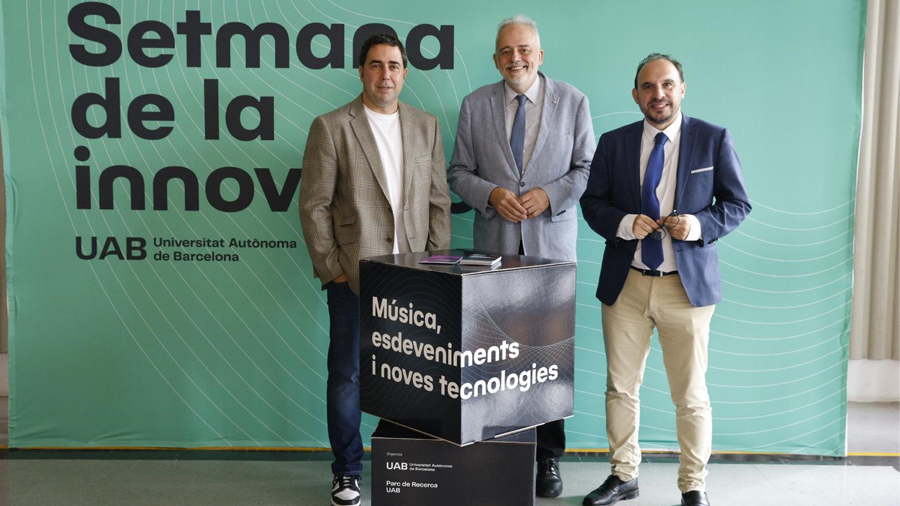The UAB and Festival Cruilla unite to bring innovative, ethical and sustainable artificial intelligence to art shows
Javier Lafuente, rector of the UAB, and Jordi Herreruela, executive director of Barcelona Events Musicals (Festival Cruïlla), presented the ENIA UAB-Cruïlla Chair in Artificial Intelligence in Music and the Arts today. The new chair will provide research support and experimentation in artificial intelligence (AI) solutions, with a strong commitment to transfer knowledge to the ecosystem of cultural industries. With a budget of €800,000, the chair will have an initial duration of three years.

The presentation took place under the framework of the Conference on Music, Cultural Events and New Technologies of the UAB's Innovation Week, which is being held from 14 to 18 October.
The chair has been granted by the Ministry for Economic Affairs and Digital Transformation as part of the National Strategy for Artificial Intelligence (ENIA). It is a public-private initiative endowed with €800,000, of which €600,000 are provided by the Ministry and €200,000 by Barcelona Events Musicals, and will have an initial duration of 3 years.
Eleven researchers from the UAB, the CVC and the IIIA-CSIC will participate in the chair, working together with the Barcelona Events Musicals team. Other leading institutions in research and innovation in the field of the arts that will collaborate are Barcelona Music Lab, the Eurecat Foundation and the Epic Foundation of La Fura dels Baus.
The scientific coordination and direction of the chair will be carried out by Dr Fernando Vilariño, lecturer in the Department of Computer Science at the UAB and associate director of the CVC, where he coordinates the Quantum Machine Learning Research Group (QML-CVC).
Barcelona Events Musicals has commissioned the Barcelona Music Lab Foundation to manage the ENIA UAB-Cruïlla Chair of Artificial Intelligence in Music and the Arts in accordance with its knowledge of the music industry.
Living labs and events: ephemeral cities with citizen participation
The ENIA UAB-Cruïlla Chair aims to foster a critical mass of AI researchers in the field of the arts working from three perspectives: one focused on AI as a content-generating tool (AI-CREATE), another to develop relevant tools for creators (AI-SUPPORT) and a third that explores AI for the development of the ecosystem of cultural and creative industries (AI-EXPERIENCE).
The chair will invite citizens to participate in the transfer of solutions developed in the context of live events, considered as small ephemeral cities with a specific life cycle and as a set of challenges that AI can help solve. This citizen-centered experimental approach will be carried out in collaboration with municipalities and the support of the Observatory of Ethics in Artificial Intelligence of Catalonia (OEIAC), and will allow to study the role of university campus and artistic events as living laboratories of AI proposals acceptable in terms of business development, ethical dimensions and sustainability guidelines.
It will also promote pre- and post-doctoral research activities between more technical fields (such as computer science, physics or mathematics) and others more linked to the arts and humanities (music, classical and digital arts and design) and applied research based on the challenges of industry, with support for entrepreneurship and transdisciplinary collaborations between artists and scientists.
The collaborating institutions will have a relevant role in the new chair. Barcelona Music Lab will contribute to the analysis and understanding of the future of music in the digital society. The Eurecat Foundation, founder and host of the Southwest Colocalization Centre (SCC) of the European Institute of Innovation and Technology (EIT) Culture & Creativity, will be a key node to connect academia and industry. The Epic Foundation of La Fura dels Baus, as a research centre for advanced arts, will help promote collaborations among the humanities, science, technology and society with the coordination of transdisciplinary workshops and live events.
After the official presentation, the chair's director, Dr Fernando Vilariño, gave ten examples of representative lines of work that will receive support from the chair. Among the examples are: generative artificial intelligence models of artistic images, digital replicas for the training of self-driving cars, tools to support the interpretation of scores, and systems for interaction with audiences in real-time.